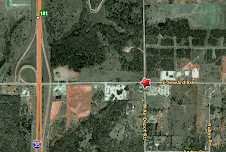Among those who reached Fort Gibson after a brutal winter on the
Trial of Tears was Milly Francis, the daughter of the Creek Prophet
Josiah Francis and the woman labeled the "Creek Pocahontas" by white
soldiers. She settled in a crude cabin nearby on the present site of Bacone
College in Muskogee.
Milly Francis is believed to be the first woman to receive a special medal
of honor (not THE Medal of Honor, but one commissioned for her) from Congress.
Although her name is sometimes given as "Malee" or "Princess
Malee," it is likely that her name was Milly. Other members of her family, as was common in
the tribes from the east, had Anglicized names from their long association and
intermarriage with European-Americans.
Born, 1803?, in the Alabama Creek Nation, her father, Josiah Francis, was
the son of a white silversmith and trader and a woman of the Creek Nation. As follower of the Shawnee prophet
Tenskwatawa, her father, called the Creek Prophet, with his teachings of a
return to traditional ways, to build unity within the nation to hold back the rapid westward expansion of white settlers, helped spark the Creek civil war. Eventually the
division in the Creek Nation 'spilled over' into the non-Indian community, the
Creek War of 1813-1814. Her father was a leader of the Red Stick movement, and English term for the traditionalist faction of Muscogee Creek people in the American Southeast in
the early 19th century.
About 10 years old when the war began, Milly saw her world destroyed. When
Andrew Jackson defeated the Red Sticks at the Battle of Horseshoe Bend,
Alabama, on March 27, 1814, her father, with his family, joined those fleeing
their homeland for the safety of Spanish Florida. By the fall of 1814, they
were facing starvation, in NW
Florida. The British, still fighting the
US in the War of 1812, provided supplies and arms to Francis and his followers
and they moved to a safer area in Florida.
When Milly was 12, her father and brother traveled to England to plead the
cause of the refugee Creeks. The prophet returned to his family in 1817 to find
his people on the verge of another war with the US.
The First Seminole War, erupted when US troops attacked a Creek village in
Southwest Georgia. An alliance of Creek and Seminole warriors retaliated by
attacking a US supply boat on the Apalachicola River and the war was underway.
General Andrew Jackson was ordered to the frontier to end the conflict. He crossed the border into Florida, Spanish
territory, in March of 1818 with thousands of soldiers accompanied by General
William McIntosh and his allied Creek warriors.
Jackson marched down the Apalachicola River to an abandoned British fort
and rebuilt the outpost, Fort Gadsden. Among the troops under his command was a
Scottish immigrant, Georgia Militia Private Duncan McCrimmon. In March 1818, McCrimmon decided to go fishing beyone the guard posts, got lost and spent several
days trying to find his way back.
Warriors from Prophet Francis' village, serving as scouts, found him and
took him prisoner.
The remainder of the story is from information given by Milly to US Army
Officers.
As Milly later explained, she was playing by the river with her
sister. They heard a war whoop and
realized that there was trouble in the village. McCrimmon had been stripped
naked, tied to a post or tree, looking fearful as the warriors prepared to
execute him. Moved by the man's plight,
Milly went to her father and begged with him to intervene. Uunder Creek law, he
could not do so, the man's fate was in the hands of those that captured him.
Milly then went to the warriors that had custody of McCrimmon. One of them
was angry at the whites because 2 of his sisters had been killed during the
Creek War. Eventually, she convinced him that killing the white man would not
bring his sisters back. He agreed to spare McCrimmon's life, on the condition
that the young man's head be shaved and he agree to live as a member of the
village. Milly, who could speak English fluently, explained this to the
soldier; he agreed. Later, he was handed
over to the Spanish at Fort St. Marks and rescued when Jackson's troops took the
fort in April.
During this time, Milly's father was lured aboard the US schooner Thomas
Shields. The commander of the vessel, Lt. Isaac McKeever, sailed into the port
of St. Marks flying a British flag and Francis and a second chief paddled out
to the ship thinking it was a British relief vessel. The Josiah was taken
prisoner, turned over to Andrew Jackson and hanged without trial by the
general's order. Milly surrendered with
her family and was instructed to travel to Fort Gadsden and from there back to
the Creek Nation in Alabama.
LtCol Matthew Arbuckle, 7th Infantry Regiment, described the incident in a
letter to McCrimmon's hometown newspaper. During summer and fall of 1818, word
of her effort in the rescue of Duncan McCrimmon was picked up by newspapers
across the county. When news reached the
Army, she received considerable attention from the officers and soldiers.
As Milly and her family traveled to Fort Gadsden enroute to the Creek
Nation, she was presented with money that had been collected for her by the
citizens of Milledgeville, Georgia, McCrimmon's hometown. The colonel's
surviving letters also indicate that Duncan McCrimmon traveled back to Fort
Gadsden during the fall of 1818 and proposed marriage to Milly Francis, which
she declined. Her family had been driven
from their ancestral home by war, her father had been hanged by the soldiers
and the crew of the Thomas Shields had fired cannon in a deliberate effort to
kill her sister. She explained to Col. Arbuckle that she had acted from feelings
of humanity alone and would have done the same for any other person facing such
a fate
With her mother and sister, Milly returned to the Creek Nation where she
married a Creek warrior and had at least 3 children before war once again
disrupted her life. Milly's husband fought and lost his life for the US in the
Second Seminole War. Meanwhile, a
faction of the Creeks, rose up against the United States during the spring of
1836. The uprising was crushed by American troops and the government ordered
the removal of the entire Creek Nation to the Indian Territory.
Milly Francis walked the Trail of Tears as a member of Tuckabatchee Hadjo's
party. Several eyewitnesses reported seeing her as she passed through Little
Rock, Arkansas, in November of 1838. She arrived at Fort Gibson in January 1838
and settled with her children in a log cabin on the northern edge of the
current city, Muskogee.
About 5 yrs later, LtCol Ethan A Hitchcock, sent to investigate allegations
of fraud against the Creeks and Seminoles, found her living in poverty. Moved by her dismal conditions, he wrote to
the Secretary of War asking that he intervene with Congress to secure a pension
that would allow her to live in reasonable comfort. For 2 years the measure was
debated. The first bill died with the end of the 1843 session, but a second
bill, in 1844, passed. It authorized a pension of $96 per year for the
"Milly, a Creek woman."
The act also provided money for the striking of a special medal to honor
Milly Francis for her role in saving the life of Duncan McCrimmon. Milly Francis died of tuberculosis before
ever receiving either her pension or the medal.
It is believed she was buried near her log cabin home. Monuments to her memory can be found in
Muskogee OK, at San Marcos de Apalache (Fort St Marks) Historic State Park,
Florida and in the Apalachicola National Forest.















No comments:
Post a Comment